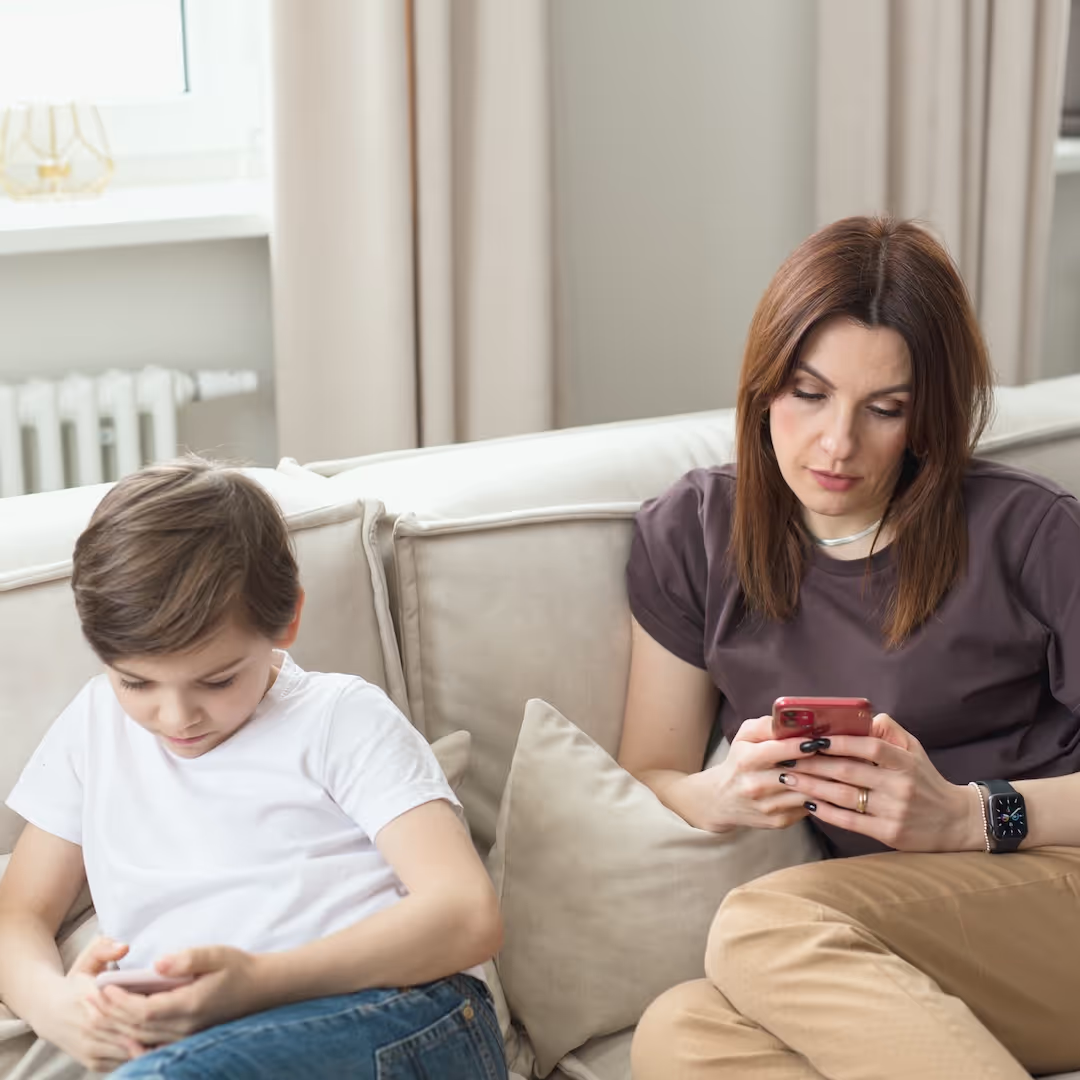


Recently, on my podcast with psychologist Jo-Ann Finkelstein, PhD, she made a point that stuck with me: many girls are losing sleep to wake early for makeup and beauty routines. I hadn’t fully considered how this affects their rest and well-being.
Another growing concern is how young girls, some as young as 7 or 8, are becoming fixated on beauty products particularly through viewing beauty routines or GRWM (Get Ready With Me) content from similarly young creators on platforms like TikTok or YouTube.
In Screenagers Elementary School Age Edition, we show clips of elementary-aged girls talking excitedly about their favorite skin and makeup items. This beauty obsession is reaching younger ages, fueled by pervasive beauty ideals on social media.
New research from Northwestern University, led by Dr. Molly Hales, examined 100 TikTok beauty routine videos by creators ages 7 to 18. Findings included:
As a doctor, I treat young people with irritated skin, and as a mom, I’m alarmed. Peer-driven beauty content, amplified by social media, is shaping how kids see themselves. The pressure to achieve a certain look is relentless, unattainable, and a toxic cycle.
Learn more about showing our movies in your school or community!
Join Screenagers filmmaker Delaney Ruston MD for our latest Podcast

Learn more about our Screen-Free Sleep campaign at the website!
Our movie made for parents and educators of younger kids
Learn more about showing our movies in your school or community!
Here are ways to start meaningful, nonjudgmental conversations:
Try to understand what your child is feeling from their perspective.
To get there, ask open-ended questions like:
You might want to share an equivalent experience from your own childhood - for example, seeing beauty tips in a teen magazine.
Watch this short clip from Screenagers: Elementary School Edition together. It features young kids showcasing their skincare and makeup routines and their excitement for brands like Sephora or Evereden. This can be a powerful springboard for a shared conversation.
Reference Dr. Hale’s TikTok study, noting that many products include ingredients that can irritate young (or any) skin. Explain how rashes or reactions may be linked to these products, something that kids might not realize on their own.
Brainstorm together:
Even if your child doesn’t change their habits immediately, this kind of dialogue plants seeds. This is about nurturing critical thinking. When we show curiosity and calmly share our thoughts — without blame — we make little inroads.
Learn more about showing our movies in your school or community!
Join Screenagers filmmaker Delaney Ruston MD for our latest Podcast

Learn more about our Screen-Free Sleep campaign at the website!
Our movie made for parents and educators of younger kids
Join Screenagers filmmaker Delaney Ruston MD for our latest Podcast
Be sure to subscribe to our YouTube Channel! We add new videos regularly and you'll find over 100 videos covering parenting advice, guidance, podcasts, movie clips and more. Here's our most recent:
As we’re about to celebrate 10 years of Screenagers, we want to hear what’s been most helpful and what you’d like to see next.
Please click here to share your thoughts with us in our community survey. It only takes 5–10 minutes, and everyone who completes it will be entered to win one of five $50 Amazon vouchers.
Recently, on my podcast with psychologist Jo-Ann Finkelstein, PhD, she made a point that stuck with me: many girls are losing sleep to wake early for makeup and beauty routines. I hadn’t fully considered how this affects their rest and well-being.
Another growing concern is how young girls, some as young as 7 or 8, are becoming fixated on beauty products particularly through viewing beauty routines or GRWM (Get Ready With Me) content from similarly young creators on platforms like TikTok or YouTube.
In Screenagers Elementary School Age Edition, we show clips of elementary-aged girls talking excitedly about their favorite skin and makeup items. This beauty obsession is reaching younger ages, fueled by pervasive beauty ideals on social media.
New research from Northwestern University, led by Dr. Molly Hales, examined 100 TikTok beauty routine videos by creators ages 7 to 18. Findings included:
As a doctor, I treat young people with irritated skin, and as a mom, I’m alarmed. Peer-driven beauty content, amplified by social media, is shaping how kids see themselves. The pressure to achieve a certain look is relentless, unattainable, and a toxic cycle.
Here are ways to start meaningful, nonjudgmental conversations:
Try to understand what your child is feeling from their perspective.
To get there, ask open-ended questions like:
You might want to share an equivalent experience from your own childhood - for example, seeing beauty tips in a teen magazine.
Watch this short clip from Screenagers: Elementary School Edition together. It features young kids showcasing their skincare and makeup routines and their excitement for brands like Sephora or Evereden. This can be a powerful springboard for a shared conversation.
Reference Dr. Hale’s TikTok study, noting that many products include ingredients that can irritate young (or any) skin. Explain how rashes or reactions may be linked to these products, something that kids might not realize on their own.
Brainstorm together:
Even if your child doesn’t change their habits immediately, this kind of dialogue plants seeds. This is about nurturing critical thinking. When we show curiosity and calmly share our thoughts — without blame — we make little inroads.
Be sure to subscribe to our YouTube Channel! We add new videos regularly and you'll find over 100 videos covering parenting advice, guidance, podcasts, movie clips and more. Here's our most recent:
Sign up here to receive the weekly Tech Talk Tuesdays newsletter from Screenagers filmmaker Delaney Ruston MD.
We respect your privacy.
Recently, on my podcast with psychologist Jo-Ann Finkelstein, PhD, she made a point that stuck with me: many girls are losing sleep to wake early for makeup and beauty routines. I hadn’t fully considered how this affects their rest and well-being.
Another growing concern is how young girls, some as young as 7 or 8, are becoming fixated on beauty products particularly through viewing beauty routines or GRWM (Get Ready With Me) content from similarly young creators on platforms like TikTok or YouTube.
In Screenagers Elementary School Age Edition, we show clips of elementary-aged girls talking excitedly about their favorite skin and makeup items. This beauty obsession is reaching younger ages, fueled by pervasive beauty ideals on social media.
New research from Northwestern University, led by Dr. Molly Hales, examined 100 TikTok beauty routine videos by creators ages 7 to 18. Findings included:
As a doctor, I treat young people with irritated skin, and as a mom, I’m alarmed. Peer-driven beauty content, amplified by social media, is shaping how kids see themselves. The pressure to achieve a certain look is relentless, unattainable, and a toxic cycle.

It feels like we’re finally hitting a tipping point. The harms from social media in young people’s lives have been building for far too long, and bold solutions can’t wait any longer. That’s why what just happened in Australia is extremely exciting. Their new nationwide move marks one of the biggest attempts yet to protect kids online. And as we released a new podcast episode yesterday featuring a mother who lost her 14-year-old son after a tragic connection made through social media, I couldn’t help but think: this is exactly the kind of real-world action families have been desperate for. In today’s blog, I share five key things to understand about what Australia is doing because it’s big, it’s controversial, and it might just spark global change.
READ MORE >
I hear from so many parents who feel conflicted about their own phone habits when it comes to modeling healthy use for their kids. They’ll say, “I tell my kids to get off their screens, but then I’m on mine all the time.” Today I introduce two moms who are taking on my One Small Change Challenge and share how you can try it too.
READ MORE >
This week’s blog explores how influencers and social media promoting so-called “Healthy” ideals — from food rules to fitness fads — can quietly lead young people toward disordered eating. Featuring insights from Dr. Jennifer Gaudiani, a leading expert on eating disorders, we unpack how to spot harmful messages and start honest conversations with kids about wellness, body image, and what “healthy” really means.
READ MORE >for more like this, DR. DELANEY RUSTON'S NEW BOOK, PARENTING IN THE SCREEN AGE, IS THE DEFINITIVE GUIDE FOR TODAY’S PARENTS. WITH INSIGHTS ON SCREEN TIME FROM RESEARCHERS, INPUT FROM KIDS & TEENS, THIS BOOK IS PACKED WITH SOLUTIONS FOR HOW TO START AND SUSTAIN PRODUCTIVE FAMILY TALKS ABOUT TECHNOLOGY AND IT’S IMPACT ON OUR MENTAL WELLBEING.
